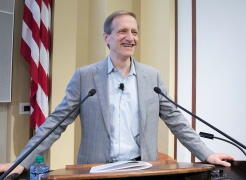The C-SPAN Archives as The Policymaking Record of American Representative Democracy: A Foreword
Almost two centuries ago, the idea of research libraries, and the possibility of building them at scale, began to be realized. Although we can find these libraries at every major college and university in the world today, and at many noneducational research institutions, this outcome was by no means obvious at the time. And the benefits we all now enjoy from their existence were then at best merely vague speculations.
How many would have supported the formation of these institutions at the time, without knowing the benefits that have since become obvious? After all, the arguments against this massive ongoing expenditure are impressive. The proposal was to construct large buildings, hire staff, purchase all manner of books and other publications and catalogue and shelve them, provide access to visitors, and continually reorder all the books that the visitors disorder. And the libraries would keep the books, and fund the whole operation, in perpetuity. Publications would be collected without anyone deciding which were of high quality and thus deserving of preservation—leading critics to argue that all this effort would result in expensive buildings packed mostly with junk. . . .















